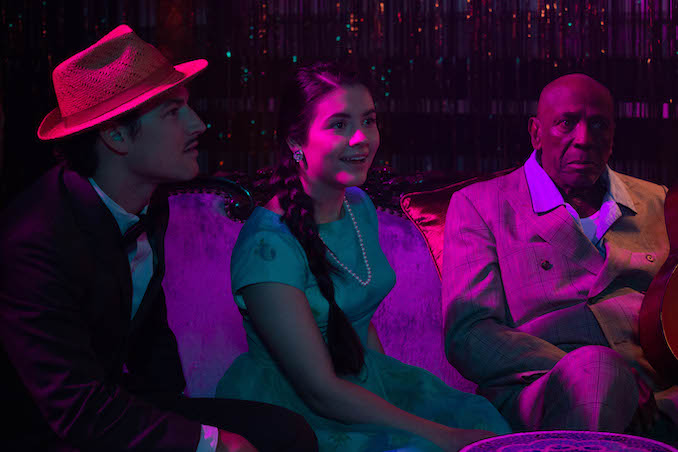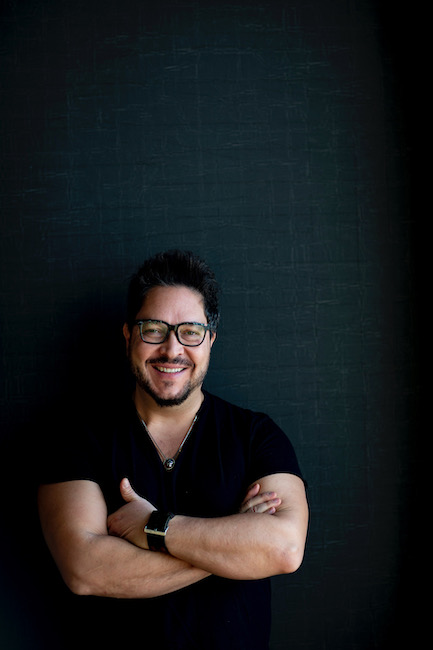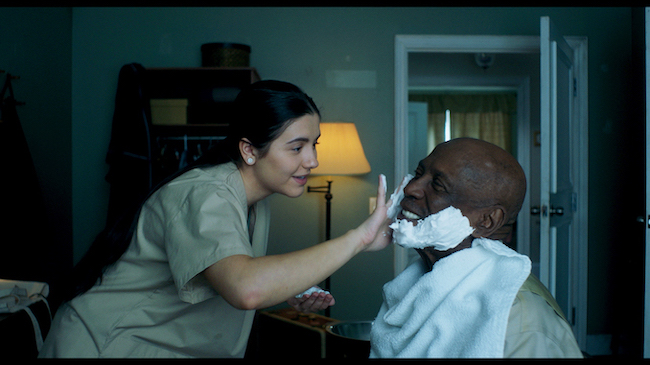THE CUBAN, starring Oscar-winning actor Louis Gossett Jr. is the third feature film from director Sergio Navarretta and it struck home for me. The joy found in memories and music coupled with the reality of someone very close to me who recently passing away with Dementia offered comfort during these healing times.
The film had originally been slated to open theatrically in April but like all film and cultural events had to be postponed due to the pandemic. However, following a successful and warmly received screening as part of the virtual edition of the Canadian Film Festival on Super Channel, the filmmakers and distributors decided to release it in a variety of creative ways including the film’s Toronto Premiere event at the recent Lavazza Drive-In Film Festival presented by the Italian Contemporary Film Festival. This follows the film’s 2019/2020 festival run including a World Premiere at the Whistler Film Festival where the film won a Borsos Award for Cinematography, followed by a US Premiere in February at the Pan African Film + Arts Festival where the film won both a Special Programmers Award and the coveted Audience Favourite for Feature Narrative Award.

Film Synopsis: A naive pre-med student Mina (Ana Golja) gets her first job in a nursing home and meets an elderly Cuban jazz musician named Luis (Louis Gossett Jr.). She realizes music triggers his memories and uses it to break him out of his Dementia and to create moments of lucidity and joy. It also reignites her love for music and changes her life forever. THE CUBAN is a touching story of an unexpected friendship that blossoms through music and the power of the imagination.
Mina was orphaned as a baby in Afghanistan. Her grandfather sends her to Canada when she as eight to live with her aunt, Bano (Shohreh Aghdashloo). A former doctor herself, Bano wants nothing more than to see her own dreams fulfilled through her niece, and she pressures her to pursue a career in medicine. Although she dutifully complies, Mina’s heart isn’t in it, and she longs to return to a better time when, as a child, she and her grandfather would sing and play music together. Thanks to Bano, Mina has a part-time job in a long term care home. But she has trouble finding her footing under the watchful eye of her tough supervisor, Nurse Baker (Lauren Holly).
Luis is one of Mina’s most enigmatic patients – he has Dementia and Alzheimer’s and spends his time in a wheelchair in a quiet corner of the room, retreated inside his own mind. He has no visitors, and Mina can relate to his solitude. They say he doesn’t have long, that his condition has advanced rapidly, and that Mina shouldn’t expect him to recognize her from one day to the next. But then, there’s the music.
THE CUBAN was initially conceived out of a dream that first-time producer, Taras Koltun, had of reuniting with his grandfather in Russia. “We were close when I was a child, but after we moved away I never got to spend any time with him or ask him questions about his life or his first love,” Koltun says. “When he passed away I was left with all these questions.” Once he shared the dream with his friend, actor Ana Golja, it transformed into a few lines on paper and the inspiration for a short film. Golja brought the concept to director Sergio Navarretta who was just coming off executive producing the star-studded animated feature, ARCTIC DOGS, and he was immediately drawn to the idea. “It was very personal,” Navarretta explains in the film’s prodution notes, “ I had lost my father around the same time…so I was dealing with this idea of ‘stories that die with us’. We have all these great men and women…just a wealth of knowledge and experience and stories, that are dying in nursing homes.” The story soon snowballed into a full feature-length film.

We had a chance to chat with Navarretta to learn more about this film…
It seems like the roles were written for the actors that play them, Louis Gossett Jr, Shohreh Aghdashloo in particular. Tell us about that?
SN: The roles were in fact written with these incredible actors in mind. I don’t typically hold auditions and generally know who I want in specific roles. With Lou, it was an easy choice. He is a living legend, and an incredible actor. Luis was written for him, and after several failed attempts, we finally got the original short film idea into his hands and the rest is history. The first meeting we had was at his home in Malibu, and the experience was surreal. I walked in, looked around and was overwhelmed by the poster of Roots (which my parents made me watch as a kid), and the various awards he had received throughout his illustrious career, including his Oscar. We had a great chat about life, about the business and about The Cuban. He has become a good friend and mentor.
Shohreh is one of my absolute favorite actresses. We met about 10 years ago at TIFF and stayed in touch all these years vowing to eventually work together. When I approached her with this role, she immediately accepted as she had a personal connection to it. Working with this caliber of talent makes my job an absolute joy and it really was a dream come true. I have wanted to work with these actors for a very long time, and finally, the stars aligned.
Dementia affects more people than we realize yet there seems to still be some stigma to discussing it openly. What did you discover about the disease when researching for this film?
SN: I was shocked at how rampant this disease is. They predict 1 in 4 will suffer from some form of dementia in the next 20 years. That is a staggering statistic. Obviously no one wants to think about that, and the stats leave us feeling completely helpless. During the research process, I learned how often times the patient with dementia is lost in their own minds, and not always suffering. However, the real tragedy is how it affects the family members and loved ones. As memories slip away, and they forget the people around them. That becomes the unthinkable nightmare that families have to face. The silver lining is that music has been shown in comprehensive research to dramatically improve the quality of life for patients, and sometimes even bring them back from a completely catatonic state. It is incredible that researchers and doctors are studying the affects of music on the brain, and that something seemingly so simple has been under our noses the whole time. Also, the mind and our imaginations are extremely powerful, and the notion of “reality” needs to be challenged more. If patients with dementia blur the line between so-called reality and fantasy, that’s ok and caretakers as well as doctors need to be more supportive and understanding.

There’s been interesting research that has been done about brain health coming right out of Toronto at Baycrest Hospital. Were you able to tap into their expertise for the film, what can you tell us about music and how it helps?
SN: Baycrest was instrumental in helping us, (particularly the writer Alessandra Piccione) in understanding the latest research, since they are at the forefront of the study of the affects of music on the minds of dementia patients. In order to pretend it and represent something so complex in a movie, I needed to see the shifts first hand. They provided research materials and videos we could watch to study how catatonic patients would literally come to life when their favorite music was played for them. Obviously every case is unique, however, the transformations were undeniable. Patients would generally be a lot more calm and happy, and in some extreme cases, I witnessed people go from completely catatonic to alert, and aware. It is remarkable to see. In fact, I used what we learned about the power of music on set. We played our soundtrack from first thing in the morning, throughout the day. It certainly helped me, and the actors get into the right headspace. No one is immune to the powerful affect music has on us, our emotions, our psychology and our overall state.
Shooting for this film took place in Brantford (Ontario) as well as Havana (Cuba). What challenges and/or beautiful moments did you encounter?
SN: One of the highlights was shooting at a hospice in Brantford Ontario. For years, people would go spend their final days there, and initially, I thought it might have been uncomfortable to shoot at a hospice, but the opposite was true. It was extremely peaceful and essentially became our home base. Also, I generally prefer to shoot outside big cities and in small towns because there is an instant bonding that takes place among the cast and crew, and that was certainly the case here. Havana is completely another world, and all the planning we did prior to shooting there was thrown out the window instantly once we got into production. It is a very beautiful culture and despite their challenges, they live very much in the moment, and are innovative in problem solving and finding ways to get things done. It pushed me way out of my comfort zone, but the biggest take away was to have a plan, but be prepared to throw it away and surrender completely to all that a place like Cuba has to offer. Ultimately it was an incredible experience that I will never forget.
The soundtrack in the film is amazing, can you tell us more about Hilario Duran’s involvement and we’re guessing the music is available for download?
SN: Thank you! I was introduced to the maestro, Hilario Duran through a friend Walter Venafro who works at the radio station Jazz FM. I quickly realized that in Canada we are extremely fortunate to have a community of world class musicians, originally from Cuba living here. I could not have imagined a more perfect fit than to have Hilario perform, write the soundtrack as well as have a cameo in the film. He brings an authenticity to the work that is incredible. The culture that is carried through the music is so upbeat and infectious, that it brings a unique spirit to The Cuban. I hope it will have audiences dancing in the isles (virtual isles or drive-in parking lots). The soundtrack is now available worldwide on all platforms.
Now with COVID19, the film is finding more creative ways to get in front of the public, including drive-ins across the country. What’s this experience been like so far for you as a filmmaker?
SN: It has been surreal. Obviously none of us ever could imagine that we would be in the midst of a global pandemic in our lifetimes. We had a choice to either hide under a rock or get busy figuring out creative ways to get this film out to the people. I spent much of my teenage years at a local drive-in, (often after band practice ) so it really resonates with me and brings back so many warm memories. Having the opportunity to share in a communal experience with audiences during an unprecedented global pandemic is really remarkable. The Cuban was designed to be seen on a big screen so this is a unique and safe way to experience it while physically distancing. It is also a film that seems suited for a drive-in. However, admittedly I could not have predicted this in my wildest dreams. In some ways, the whole experience to date has surpassed all my expectations, and that is the silver lining.
Have you heard or seen any audience members get up and Salsa, Rumba, or Danzon at the drive-ins?
SN: Yes, I have seen audiences dancing inside their cars or on the car roofs. Afro-Cuban jazz can do that to you. If you have ever been to Cuba, you know what I mean. Those rhythms can be heard on every street corner, and you can’t help but dance. (The Cuban rum may have something to do with it too). Cuban music has the ability to transcend racial, economic and cultural barriers. It is jovial and will get even the most timid person moving their hips and tapping their feet.
How has the pandemic adjusted your view on life or your work as a filmmaker moving forward?
SN: I don’t believe the notion of returning to “normal” is realistic at all. This pandemic has changed us forever. The way we used to approach life or work will no longer be the same. We have all been put in a time out and as the world hit the reset button, it is our responsibility to rise to the occasion and reflect on our values, our lives and what is important to us. It has really accelerated change I was already thinking about, like our relationship to our elders, the value of friendships, family and a burning desire to be involved in projects that have a strong social message which help us understand the human condition a little better. Mostly, it forced me to come to terms with my own mortality and never take anything for granted. Serendipitously, these themes are represented in The Cuban, so the timing for the release could not be better.
THE CUBAN kicked off a Canada-wide drive-in theatre summer tour this past week at the 5 Drive-In in Oakville with more dates at the 5 Drive-in TBA. Additional dates currently confirmed include the Stardust Drive-In in Newmarket on Aug 5th, the Sunset Barrie Drive-In on Aug 11th, and Starlite Drive-In Stoney Creek Drive-In on Aug 19th. The movie is also starting to book some indoor cinemas and is booked into the Regina Rainbow Theatre Aug 14-16 and the Roxy in Saskatoon on Aug 15th.
THE CUBAN will also come out on VOD in October/November.
Here’s a look at the official trailer…

